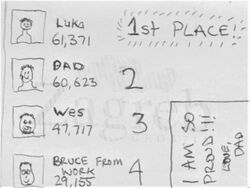QS Adventures with my Kids
| Project Infobox | |
|---|---|
| Self researcher(s) | Bill Schuller |
| Related tools | Fitbit, scale |
| Related topics | Sports and fitness, Diet and weight loss, Heart rate, Sleep, Activity tracking |
Builds on project(s) |
|
| Has inspired | Projects (0) |
| Show and Tell Talk Infobox | |
|---|---|
| Featured image | 
|
| Date | |
| Event name | 2013 QS Global Conference |
| Slides | |
| This content was automatically imported. See here how to improve it if any information is missing or out outdated. |
QS Adventures with my Kids is a Show & Tell talk by Bill Schuller that has been imported from the Quantified Self Show & Tell library.The talk is about Sports and fitness, Diet and weight loss, Heart rate, Sleep, and Activity tracking.
Description[edit | edit source]
A description of this project as introduced by Quantified Self follows:
Bill started tracking his exercise and weight in 2010. His preschool-aged son, began to imitate Bill’s tracking behavior, regularly stepping on the scale, not to watch his weight, but to just check his numbers. Bill then designed tracking games for him and his son. One of them involved putting things away in the house while tracking steps and gaining “clean-up points.” In this talk, he shares more stories about how he and his children play with self-tracking.
Video and transcript[edit | edit source]
A transcript of this talk is below:
Bill Schuller - QS Adventures with my Kids
Hello, I’m Bill Schuller. I have very strong qualifications; I’m a father. That’s all I’m going to list here, a father of two children, Luka who is six and Annie who is turning four at the end of the month. I have though my own experiences quantifying with my kids as well. They have seen the gadgets and me logging food and paying more attention to what I’m doing and they have done the same. We’ve really gravitated to the most accessible technology; they step on the Withing’s scale in the bathroom on their own. They’ve been doing that ever since they were able to stand still on it for long enough. My son carries a Fitbit. They don’t always make it through playtime; he’s got a new one now. My daughter loves to pretend to quantify. She’ll take anything that’s about the shape of a pedometer, put it on her waist and count her steps, and she loves to play with the Zeo. She doesn’t hold still long enough even in her sleep to actually get any data. But I often have to go into her bedroom at night to retrieve my headband so I can track my own sleep. But we have been getting pretty good consistent numbers for sleep and activity from my son Luka. This was something that totally surprised me. My kids come home with pictures from school just like anybody else. But sometimes the people in my kids pictures are wearing a pedometer or a heartrate monitor or something like that. And infact when I shared my secret for getting more steps during the day and why I was exceeding my son I told them I play music at my desk at my standing work station and I dance a little bit. And so he insisted on himself that I had four that work and illustrate it in a drawing. I’m in a habit of writing a little note to include in their lunch most days and I came across a few that kind of celebrated some of his QS milestones. This was the first night he was able to keep the Zeo on long enough to exceed my sleep score. This was the first time that he was able to get tie the top of the Fitbit leaderboard and beat not only me but Wes, who is the father of one of the kids that was in his pre-school and Bruce from work who is always referred to as Bruce from work, who is one of my colleagues and was the original inspiration for Luka’s continued self-tracking, because he was able to get more steps than the mild-mannered system administrator Bruce from work. And that competition has been a big fuel for his continued tracking and competing with the other members of the family and himself. My kids love to play with QS and pretend to be QS, but it hasn’t all fun and games. It really has facilitated some what I would imagine to be tougher contestations that a father has with their children about cause and effect relationships, and I’ve been able to get them to understand the relationship between activity during the day and how it affects your sleep at night. And they accept the fact that those cause and affect relationships exists, so when I say your ice-cream that you eat right now is going to make it difficult for you to go to sleep. They are very accepting of and generally eat the ice-cream anyway. I’m also fascinated with the idea of how pervasive it is becoming in children’s lives. This year at the school fun run, the local dentist funded pedometers for every single kid in our elementary school. So every kid went home with a pedometer that they learned how to use during the fun run.
So this kind of brings to the head of what I’m really amazed at is I get really excited about the data that I look back at of the three years of data that I’ve collected, and I realize that my children will have right now have an entire lifetime of data to look back on and interested in finding out how that changes their perspective of growing up and the decisions they make in their life.
About the presenter[edit | edit source]
Bill Schuller gave this talk.